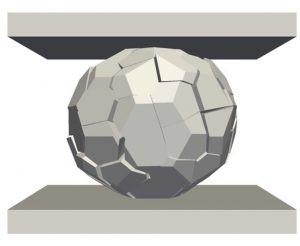D. Cantor, E. Azéma, P. Sornay and F. Radjai, Comp. Part. Mech.
DOI 10.1007/s40571-016-0129-0

Snapshots of a particle composed of 75 cells undergoing incip- ient breakage under the action of a vertical force
We present a three-dimensional numerical method for the simulation of particle crushing in 3D. This model is capable of producing irregular angular fragments upon par- ticle fragmentation while conserving the total volume. The particle is modeled as a cluster of rigid polyhedral cells gen- erated by a Voronoi tessellation. The cells are bonded along their faces by a cohesive Tresca law with independent tensile and shear strengths and simulated by the contact dynam- ics method. Using this model, we analyze the mechanical response of a single particle subjected to diametral compres- sion for varying number of cells, their degree of disorder, and intercell tensile and shear strength. In particular, we iden- tify the functional dependence of particle strength on the intercell strengths. We find that two different regimes can be distinguished depending on whether intercell shear strength is below or above its tensile strength. In both regimes, we observe a power-law dependence of particle strength on both intercell strengths but with different exponents. The strong effect of intercell shear strength on the particle strength reflects an interlocking effect between cells. In fact, even at low tensile strength, the particle global strength can still considerably increase with intercell shear strength. We finally show that the Weibull statistics describes well the particle strength variability.